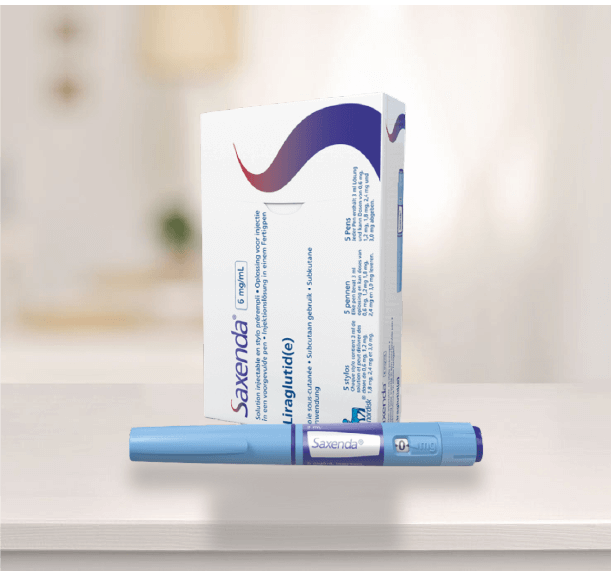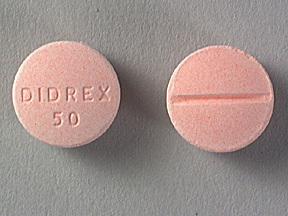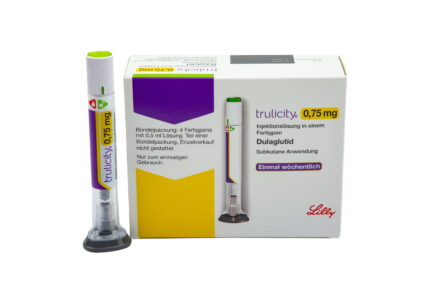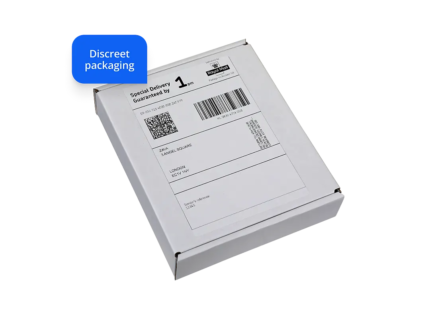What is Saxenda?
Liraglutide is a medication marketed under the brand name Saxenda, which is used to treat obesity. It is a glucagon-like peptide-1 (GLP-1) receptor agonist, which means that it mimics the activity of the GLP-1 hormone in the body. GLP-1 is a hormone that is produced in the gut and stimulates the release of insulin, which helps to regulate blood sugar levels. It also slows down the rate at which food leaves the stomach, which can reduce appetite and help with weight loss.
Saxenda is administered as a subcutaneous injection once daily, typically in the abdomen, thigh, or upper arm. It is often used in conjunction with diet and exercise to help people with a body mass index (BMI) of 30 or higher, or a BMI of 27 or higher with weight-related health problems such as high blood pressure, diabetes, or high cholesterol, to lose weight and improve their overall health.
Saxenda has been shown to be effective in clinical trials, with many patients experiencing significant weight loss. However, it can have side effects, including nausea, vomiting, diarrhea, constipation, and stomach pain. It can also increase the risk of thyroid cancer and pancreatitis in some patients, so it is important to talk to a healthcare professional about any potential risks or side effects before starting treatment with Saxenda.
Read the Medication Guide and the Instructions for Use Leaflet provided by your pharmacist before you start using liraglutide and each time you get a refill. Learn all preparation and usage instructions. If you have questions, ask your doctor or pharmacist.
Inject this medication under the skin in the thigh, abdomen, or upper arm as directed by your doctor, usually once daily. Your doctor will start you on a low dose first to decrease your risk of stomach/abdominal side effects, and gradually increase your dose. If more than 3 days have passed since your last liraglutide dose, ask your doctor if you should restart the medication with the low dose to reduce your chance of side effects. Follow your doctor’s instructions carefully.
Before using, check this product visually for particles or discoloration. If either is present, do not use the liquid. Before injecting each dose, clean the injection site with rubbing alcohol. Change the injection site each time to lessen injury under the skin.
Use this medication regularly to get the most benefit from it. To help you remember, use it at the same time each day. Carefully follow the meal plan and exercise program your doctor has recommended.
Do not share your pen device with another person, even if the needle is changed. You may give other people a serious infection, or get a serious infection from them. Learn how to store and discard medical supplies safely.
See also Warning section.
Nausea, vomiting, stomach upset, diarrhea, gas, heartburn, or constipation may occur. Nausea usually lessens as you continue to use liraglutide. If any of these effects persist or worsen, tell your doctor or pharmacist promptly.
Remember that your doctor has prescribed this medication because he or she has judged that the benefit to you is greater than the risk of side effects. Many people using this medication do not have serious side effects.
Persistent vomiting/diarrhea may result in a serious loss of body water (dehydration). Contact your doctor promptly if you notice any symptoms of dehydration, such as unusual dry mouth/thirst or dizziness/lightheadedness.
Tell your doctor right away if you have any serious side effects, including: signs of kidney problems (such as change in the amount of urine), yellowing eyes/skin, fast heartbeat, mental/mood changes (such as depression, thoughts of suicide), signs of low blood sugar (sudden sweating, shaking, fast heartbeat, hunger, blurred vision, dizziness, or tingling hands/feet).
Get medical help right away if you have any very serious side effects, including: signs of pancreatitis or gallbladder disease (such as persistent nausea/vomiting, severe stomach/abdominal pain).
A very serious allergic reaction to this drug is rare. However, get medical help right away if you notice any symptoms of a serious allergic reaction, including: rash, itching/swelling (especially of the face/tongue/throat), severe dizziness, trouble breathing.
See also Warning section.
Before using liraglutide, tell your doctor or pharmacist if you are allergic to it; or if you have any other allergies. This product may contain inactive ingredients, which can cause allergic reactions or other problems. Talk to your pharmacist for more details.
Before using this medication, tell your doctor or pharmacist your medical history, especially of: kidney disease, disease of the pancreas (pancreatitis), mental/mood disorders (such as depression, thoughts of suicide), certain stomach/intestinal disorders (gastroparesis, problems digesting food).
Before having surgery, tell your doctor or dentist about all the products you use (including prescription drugs, nonprescription drugs, and herbal products).
If you have diabetes, this product may affect your blood sugar. Check your blood sugar regularly as directed and share the results with your doctor. Tell your doctor right away if you have symptoms of low blood sugar (see Side Effects section). Your doctor may need to adjust your diabetes medication(s), exercise program, or diet.
This medication must not be used during pregnancy. It may harm an unborn baby. If you become pregnant or think you may be pregnant, tell your doctor right away.
It is unknown if this medication passes into breast milk. Consult your doctor before breast-feeding.
Before using the liraglutide pen for the first time, store it in the refrigerator. Do not freeze. After first use, liraglutide can be stored at room temperature or in the refrigerator. Protect from heat and sunlight. Discard 30 days after first use, even if some drug remains in the pen. Keep all medications away from children and pets.
Do not flush medications down the toilet or pour them into a drain unless instructed to do so. Properly discard this product when it is expired or no longer needed. Consult your pharmacist or local waste disposal company.
Drug interactions may change how your medications work or increase your risk for serious side effects. This document does not contain all possible drug interactions. Keep a list of all the products you use (including prescription/nonprescription drugs and herbal products) and share it with your doctor and pharmacist. Do not start, stop, or change the dosage of any medicines without your doctor’s approval.
Some products that may interact with this drug include: diabetes medications (such as insulin, sulfonylureas including glyburide).
Do not use this medication with any other product that contains liraglutide or other medications which are similar to this medication, but used for diabetes (such as exenatide, dulaglutide).
If someone has overdosed and has serious symptoms such as passing out or trouble breathing, call 911. Otherwise, call a poison control center right away. US residents can call their local poison control center at 1-800-222-1222. Canada residents can call a provincial poison control center. Symptoms of overdose may include: severe nausea/vomiting.
















Reviews
There are no reviews yet.